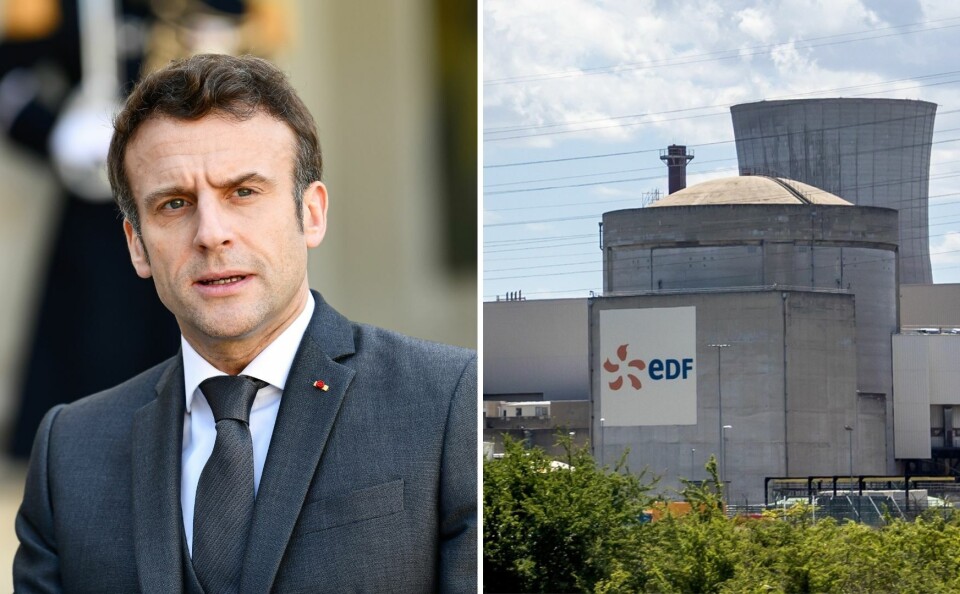-
Letters: The reality of finding a new doctor or dentist in France
Finding a replacement is nigh impossible, says Connexion reader in Lot-et-Garonne
-
The magic of mayonnaise: Why a homemade emulsion always woos guests in France
Plus, which shop-bought mayo brand is best?
-
Letters: Beware the financial cost of losing a spouse in France
Connexion reader faced unexpected expenses and legal hurdles after their partner's death, which added stress to an already difficult time
‘Macron’s nuclear power push is high-risk and high-reward for France’
Columnist Richard Ogier takes a look at the president’s ‘herculean’ commitment to nuclear energy

For the France of nuclear energy, it ought to be the best of times.
As numerous nations up the ante on the atom, it makes sense to be mining, as it were, the French nuclear example.
With one of the largest and most sophisticated nuclear industrial complexes in the world, almost 70% of French electricity comes from nuclear, France is drafting legislation due to go before the parliament in December, that could usher in a brilliant new dawn for the sector. Or mean a long winter’s night of disillusion.
The draft law cuts red tape for the construction of six new nuclear reactors with the possibility of eight more.
It follows President Macron’s announcement of a massive national nuclear ‘renaissance’, at the core of a climate and energy strategy aimed at achieving carbon neutrality by 2050.
Read more: France to build six nuclear reactors and 50 offshore wind farms
Six new reactors by 2035
The strategy, first announced in February, comes wrapped in both a big-picture political pitch, to make France a “great ecological nation”, and a promise to “go twice as fast on cutting greenhouse gas emissions”.
Covering a wide range of subjects from biodiversity to farming, it outlines big ticket investment in renewable energy, notably offshore wind.
Read more: France aims to overcome local discontent in wind farm push
Read more: France sets new peak solar power output – but not due to heatwave
But the most striking aspect, arguably the utopian element, is the herculean pledge to build the six new reactors (model EPR2) with the first to be in service by 2035, and a possible additional eight by 2050.
There’s value in sweeping national energy strategies, when the tendency in some countries, like Australia, has been to prevaricate while insisting on the imperative of fossil fuels, highly lucrative export earners but a metaphor for long-term environmental destruction.
Spiralling costs for unfinished reactor
Yet the sheer scale and dimension of Macron’s initiative invites a certain scepticism.
France has put no new commercial reactor into service for more than 20 years and no EPR has ever actually been completed in France.
Work began on a first French EPR in 2003 at Flamanville in the north-west, for delivery in 2012 at a cost of €3billion. But earlier this year, state power utility Electricité de France (EDF) announced further delays through 2023 and a staggering €16billion cost blowout.
The delays are due to no lack of urgency
Of France’s ageing infrastructure of 56 nuclear reactors, almost half are at a standstill for maintenance, with schedules slowed by the Covid pandemic and industrial action, or due to what the national nuclear watchdog has worryingly called, “corrosion”.
And this at perhaps the worst possible time, given the global impacts of Russia’s war on Ukraine on fuel prices and food security.
Yet France’s relative energy independence, nuclear expertise and strict safety regime are widely recognised and a source of national pride.
France has never had a large-scale nuclear accident à la Chernobyl, Fukushima, or Three Mile Island in the US.
Pro-nuclear comic book was best seller in France
In a country with few anti-nuclear voices, Jean-Marc Jancovici, a high-profile engineer and climate activist, was able to write a vast best-seller last year arguing the virtues of nuclear energy as almost carbon neutral, cheap for consumers and a high-efficiency, “non-intermittent” energy source.
In long comic book form, Le Monde sans fin (The World Without End) has sold half a million copies.
Yes, nuclear energy produces toxic waste, but nuclear science knows how to store it. And there is comparably little of the highest-grade variety.
“A gram of uranium produces as much heat as 2.5 tonnes of coal or a tonne of petrol,” Jancovici writes.
“The long-life, high-level waste produced since the beginning of nuclear power (in France) 50 years ago could fit into an Olympic-size swimming pool.”
Read more: France inches towards nuclear waste solution as more reactors planned
France needs reactors in extra-large
The so-called Small and Medium Reactors (SMRs) favoured in the US and Canada, where four provinces are working on an SMR development project, probably wouldn’t work for France because they are not powerful enough, many experts claim.
SMRs may ultimately prove cheaper and easier to deploy than the concrete cathedrals of the EPR. But France, it seems, needs the optimised EPR2, size XXL.
How much nuclear energy is enough for France and Europe?
Phuc-Vinh Nguyen, energy specialist at the Jacques Delors Institute in Paris, a think tank, says the answer lies in the energy mix, because it can be coordinated at both the national and European levels.
Above all, he says, “avoid putting all your eggs in one basket.”
Perhaps the climate crisis has reached such proportions that it’s necessary to push ahead forcefully on all the major, would-be solutions. And at speed.
Related articles
Explainer: What is a ZAD land zone and where are they in France?
Enedis’ energy-saving water heater plan: five questions and answers
Climate change in France: People ‘do not understand what’s coming’
























